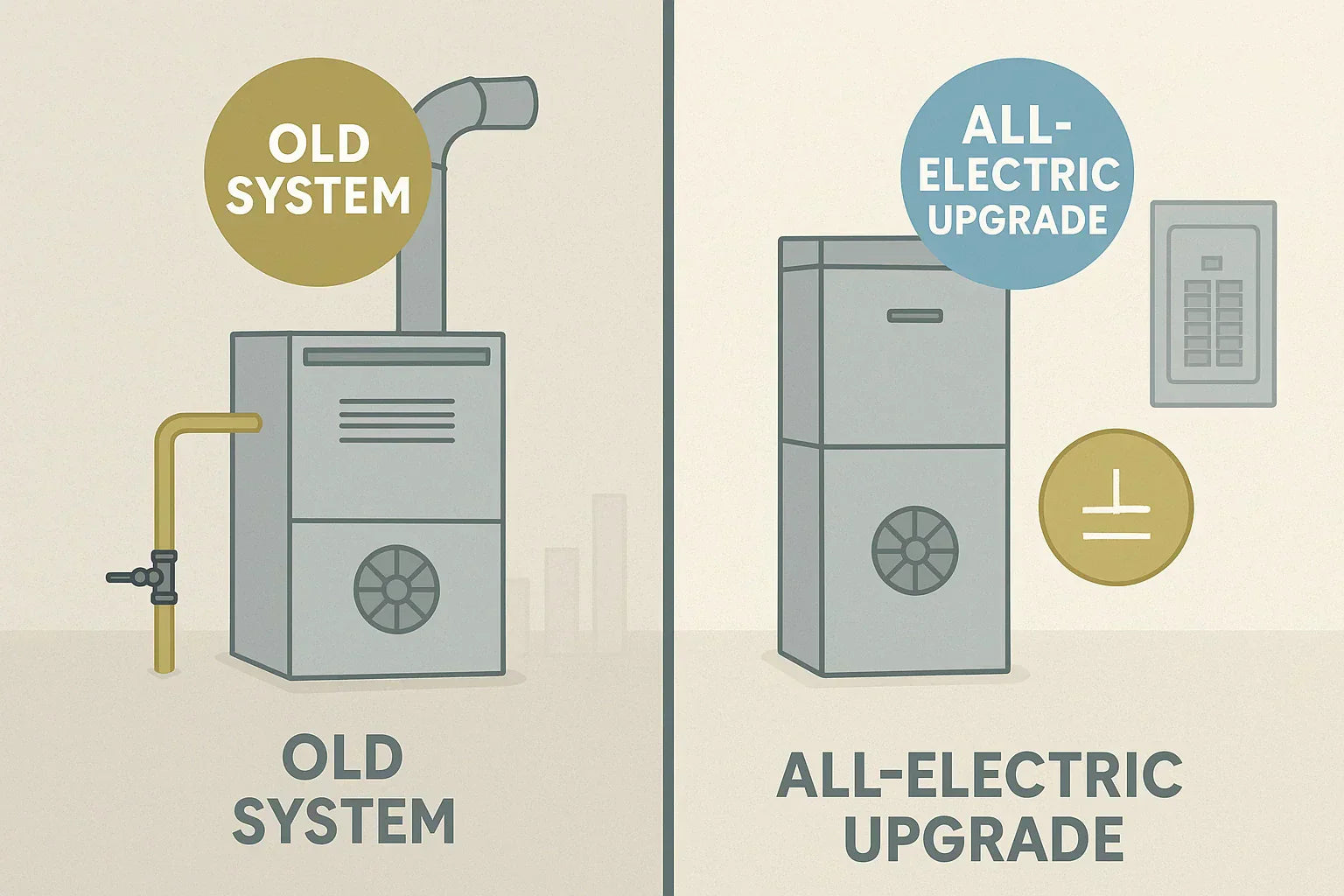Alex Lane here — your Home Comfort Advocate.
If you're thinking about switching from a gas furnace to an electric one, you’re not alone. In 2025, more homeowners are making the move — driven by rising gas prices, solar adoption, and growing rebates for electrification.
But swapping systems isn’t plug-and-play. From panel upgrades to permits, there are real costs and considerations involved. Let’s walk through everything you need to know before making the switch — so you can decide if it’s right for your home, climate, and budget.
Why More Homeowners Are Going Electric
Three big reasons are driving this trend:
-
🔥 Fuel cost volatility – Natural gas prices are rising in many regions.
-
🌱 Clean energy shift – Electric systems can run on solar or renewable grids.
-
🛠️ Simpler upkeep – No combustion = fewer parts to service.
That said, electric heating isn’t ideal in every situation. For a full breakdown of both systems, check out the main guide:
👉 Gas vs. Electric Furnaces: Which Is Better?
Pros and Cons of Electric Heating
✅ Advantages
-
Lower maintenance (no burners or flue)
-
No risk of carbon monoxide
-
Quiet, clean operation
-
Pairs well with solar and battery backup
⚠️ Drawbacks
-
Higher electricity costs in some regions
-
May require electrical panel upgrade (costly)
-
Slower to heat in very cold climates
-
Rebates vary by location
What’s Involved in the Conversion?
Switching to electric heat isn’t just about replacing equipment. Here's what you’ll likely need:
Electrical Panel Upgrade
Most electric furnaces require a dedicated 240V line. Older homes with 100-amp service often need to upgrade to 200 amps.
Check out Home Depot’s guide to panel upgrades to understand capacity and cost.
Estimated cost: $2,000–$4,000
Permits and Safety Codes
Most jurisdictions require electrical and mechanical permits for fuel conversion projects. You may also need an inspection and panel label updates.
This isn’t a DIY project — hire a licensed HVAC and electrical contractor.
Ductwork & Thermostat
-
Your ductwork can usually be reused
-
You may need to reseal or insulate it
-
Make sure your thermostat supports electric resistance heat (or upgrade to a smart model)
How Much Does It Cost?
Here’s a ballpark breakdown in 2025 dollars:
| Component | Estimated Cost |
|---|---|
| Electric furnace | $1,500–$3,000 |
| Electrical panel upgrade | $2,000–$4,000 |
| Permits + labor | $500–$1,500 |
| Total | $4,000–$8,500 |
When budgeting, it’s smart to consider energy usage. A typical electric furnace draws 10,000–50,000 watts, depending on size and runtime. Learn more in EnergySage’s wattage breakdown.
Incentives and Rebates
Thanks to the Inflation Reduction Act and local utility programs, you may qualify for:
-
Federal tax credits
-
Rebates for switching to electric heating
-
Smart thermostat or load management incentives
Use Rewiring America’s incentive tool to check what’s available in your ZIP code.
When Does It Make Sense to Switch?
You’re a good candidate for electric conversion if:
-
Your home is solar-ready
-
You live in a mild or moderate climate
-
Your gas furnace is 15+ years old
-
You’re already upgrading your electrical panel
-
You’re planning an ADU or a new build with all-electric infrastructure
Trane’s guide to electrification offers a helpful overview of when it works best.
When You Might Stick With Gas
Gas could still be your best option if:
-
You live in a very cold region
-
Electricity is more expensive per BTU in your area
-
Your panel can’t handle more load
-
Your existing gas system is new or under warranty
Pre-Switch Checklist
Before committing, review these:
✅ Panel has enough capacity (or is upgrade-ready)
✅ You’ve explored rebates and tax credits
✅ Your climate zone favors electric heat
✅ A licensed HVAC contractor is involved
✅ Your long-term energy plans support the switch
Still comparing lifetime value? Start here:
👉 Upfront vs. Long-Term Costs: Comparing Gas and Electric Furnaces
Final Thoughts: Should You Make the Switch?
Swapping a gas furnace for an electric one isn’t just an equipment upgrade — it’s a long-term energy decision. The right choice depends on your climate, electrical setup, and budget.
Electric is gaining ground in solar-ready homes, ADUs, and warm-climate zones — but it isn’t for everyone. What matters most is that your heating setup fits your home and future energy goals.
Let me know if you want to explore hybrid systems, backup heat options, or what your electric bill might look like after the switch — I’m here to help you heat smarter.
Alex Lane
Your Home Comfort Advocate







